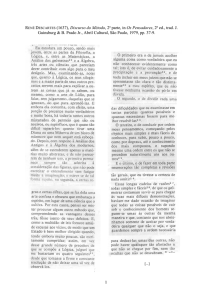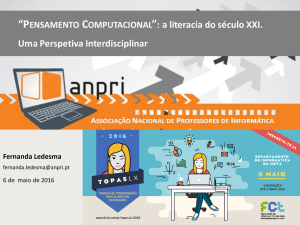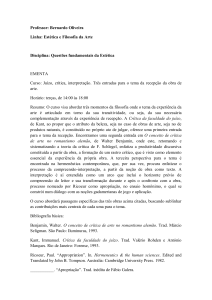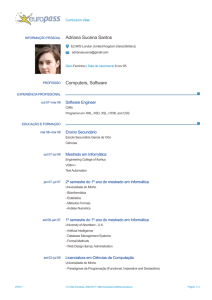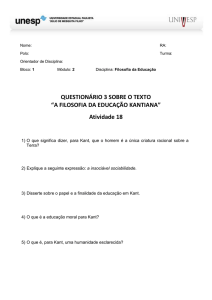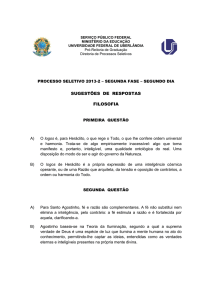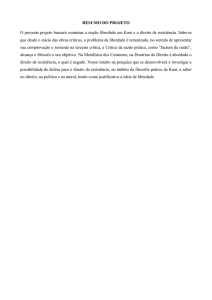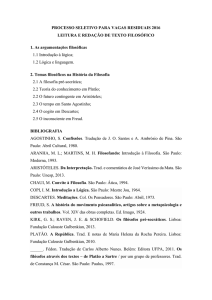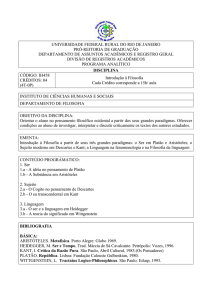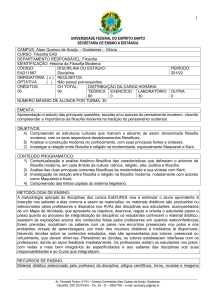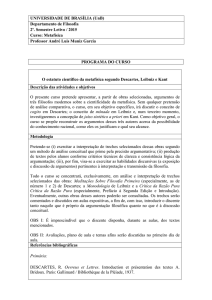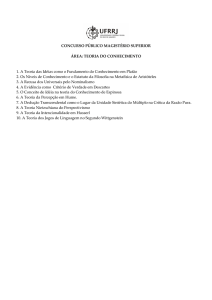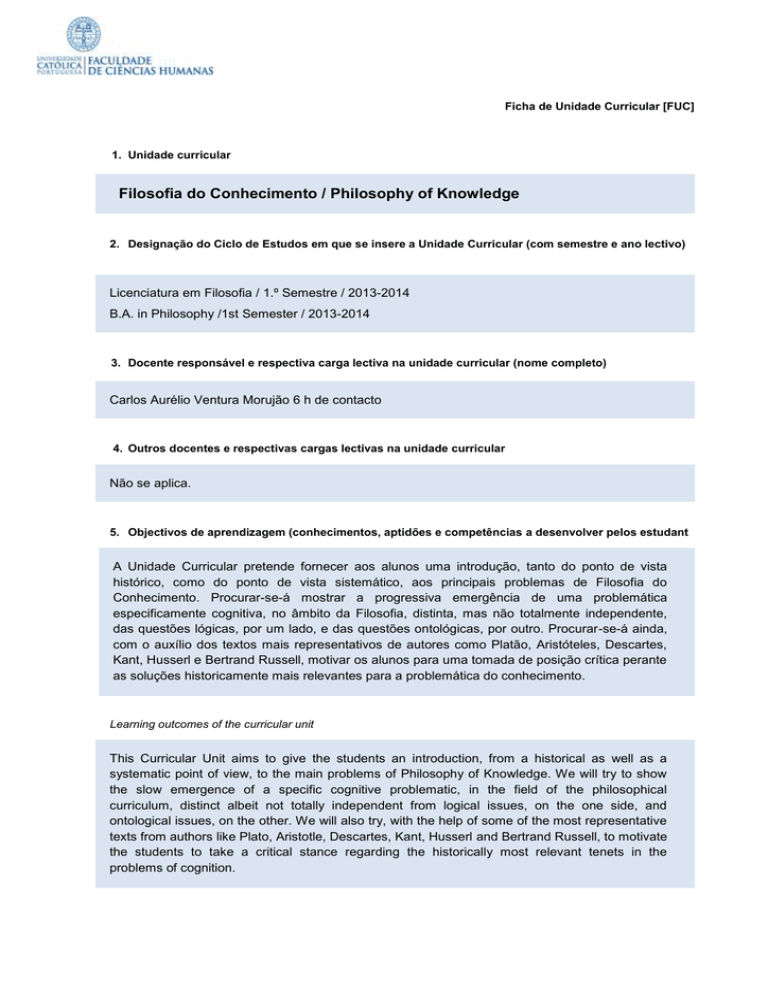
Ficha de Unidade Curricular [FUC]
1. Unidade curricular
Filosofia do Conhecimento / Philosophy of Knowledge
2. Designação do Ciclo de Estudos em que se insere a Unidade Curricular (com semestre e ano lectivo)
Licenciatura em Filosofia / 1.º Semestre / 2013-2014
B.A. in Philosophy /1st Semester / 2013-2014
3. Docente responsável e respectiva carga lectiva na unidade curricular (nome completo)
Carlos Aurélio Ventura Morujão 6 h de contacto
4. Outros docentes e respectivas cargas lectivas na unidade curricular
Não se aplica.
5. Objectivos de aprendizagem (conhecimentos, aptidões e competências a desenvolver pelos estudant
A Unidade Curricular pretende fornecer aos alunos uma introdução, tanto do ponto de vista
histórico, como do ponto de vista sistemático, aos principais problemas de Filosofia do
Conhecimento. Procurar-se-á mostrar a progressiva emergência de uma problemática
especificamente cognitiva, no âmbito da Filosofia, distinta, mas não totalmente independente,
das questões lógicas, por um lado, e das questões ontológicas, por outro. Procurar-se-á ainda,
com o auxílio dos textos mais representativos de autores como Platão, Aristóteles, Descartes,
Kant, Husserl e Bertrand Russell, motivar os alunos para uma tomada de posição crítica perante
as soluções historicamente mais relevantes para a problemática do conhecimento.
Learning outcomes of the curricular unit
This Curricular Unit aims to give the students an introduction, from a historical as well as a
systematic point of view, to the main problems of Philosophy of Knowledge. We will try to show
the slow emergence of a specific cognitive problematic, in the field of the philosophical
curriculum, distinct albeit not totally independent from logical issues, on the one side, and
ontological issues, on the other. We will also try, with the help of some of the most representative
texts from authors like Plato, Aristotle, Descartes, Kant, Husserl and Bertrand Russell, to motivate
the students to take a critical stance regarding the historically most relevant tenets in the
problems of cognition.
6. Conteúdos programáticos
1.
Nas origens do problema do conhecimento.
1.1. Conhecer, sentir, percecionar. O exemplo do Teeteto de Platão. O relativismo sofista e o
problema do valor do conhecimento.
1.2. Aristóteles: a ciência como conhecimento pelas causas. O problema dos primeiros
princípios.
2.
O problema do conhecimento na Idade Moderna.
2.1. Descartes e o problema da certeza. Conhecimento sensível e conhecimento racional. A
origem das ideias. O modelo matemático e a importância da geometria analítica. O
problema do método. A mathesis universalis.
2.2. O problema do conhecimento na filosofia do empirismo inglês. A origem das ideias. O
problema das ideias gerais. Ser, perceber e ser percebido em Berkeley. O problema da
indução em Hume.
2.3. A filosofia crítica de Kant. A crítica da razão e o problema dos limites do conhecimento. A
resposta de Kant ao problema humeano: a distinção entre fenómenos e númenos. A
priori e a posteriori. Sensibilidade e entendimento.
3.
Algumas soluções contemporâneas.
3.1. A Fenomenologia de Husserl. A retomada da questão da intencionalidade a partir de
Brentano. A estrutura do conhecimento: o todo e as partes, presença e ausência,
diversidade e identidade. A análise intencional: matéria dos actos e qualidade dos actos.
Noese e noema. A evidência.
3.2. Bertrand Russell. O sentido e a referência. Conhecimento por contacto e conhecimento
por descrição. Nomes próprios e descrições.
Syllabus
1.
At the origin of the problem of knowledge.
1.1. Knowledge, sense-data and perception. Plato’s Theatetus. The epistemological relativism
of the sophists and the problem of the value of knowledge.
1.2. Aristotle : science as a knowledge by the causes. The first principles of knowledge.
2.
The problem of knowledge at the modern age.
2.1. Descartes and the search for certainty. Sensible and rational knowledge. The origin of
ideas. The mathematical model and the importance of analytical geometry. The problems
of method. The mathesis universalis.
2.2. The problem of knowledge in the philosophy of british empiricism. The origin of ideas.
The discussions about general ideas. Being, perceiving and being perceived in Berkeley.
The problem of induction in David Hume.
2.3. Kant’s critical philosophy. The critique of reason and the limits of knowledge. Kant’s
answer to the humean problem: the distinction between phenomena and noumena. A
priori and a posteriori. Sensibility and understanding.
3.
Some contemporary solutions.
3.1. Husserl’s phenomenology. The problem of intentionality and Brentano’s legacy. The
structure of knowledge: wholes and parts, presence and absence, multiplicity and
identity. Intentional analysis : act matter and act quality. Noesis and noema. The
evidence.
3.2. Bertrand Russell. Sense and reference. Knowledge by acquaintance and knowledge by
description. Proper names and descriptions.
8. Metodologia de ensino (avaliação incluída)
Ensino: O curso realizar-se-á em regime b-learning; o aluno terá uma aula mensal presencial e
pelo menos três aulas mensais em regime on-line. Serão explorados os seguintes Recursos e
Actividades da plataforma de ensino: páginas de lição, páginas de texto, glossário, fórum e wiki.
No início do curso, será fornecido aos alunos um cronograma da disciplina, com a
calendarização das actividades.
Avaliação: A avaliação consistirá numa prova escrita final, que valerá 50 % da classificação; por
um trabalho on-line (modelo: envio de ficheiro avançado), que valerá 30 % da classificação final,
e por actividades a realizar na plataforma, às quais caberão 15 % da classificação final. Os
restantes 5 % serão atribuídos à participação nas aulas presenciais.
Teaching methodologies (including evaluation)
Teaching: The Unit will take place in a b-learning regime: the students will have one class-room
session and at least three on-line lessons each month. The following Resources and Activities of
the teaching platform will be explored: pages of lesson, pages of text, glossaries, forums and wiki.
At the beginning of the Unit a schedule of the semestrial activities will be given to the students.
Evaluation: The evaluation will consist on a class-room written text, at the end of the semester
(50 % of the total of the final classification) and several activities in the teaching platform (one online paper: 30 % of the final classification; other platform activities: 15 %). The remaining 5 % will
be attributed to the oral participation in the class-room sessions.
9. Bibliografia principal
Main bibliography
Bibliografia primária:
Aristote, Les Seconds Analytiques (trad. de Jean Tricot), Paris, Vrin, 1979.
Descartes, Discours de la Méthode, in Oeuvres de Descartes, ed. Adam & Tannéry, Paris,
1897, vol. VI.
Husserl, Edmund, «5.ª Investigação Lógica», in Investigações Lógicas (trad. de Pedro M. S.
Alves e Carlos Morujão), Segundo Volume, Parte I, Lisboa, Centro de Filosofia da
Universidade de Lisboa, 2007.
Kant, Prolegómenos a toda a Metafísica Futura (trad. de Artur Morão), Lisboa, Ed. 70,
1982.
Platão, Teeteto (trad. de José Trindade Santos), Lisboa, Fundação Calouste Gulbenkian,
2010.
--------- Theaetetus (trad. de Robin A. H. Waterfield), Harmondsworth, Penguin Books, 1987.
Russell, Bertrand, «On the Nature of Acquaintance», in Logic and Knowledge, London and
New York, Routledge, 2001, pp. 125-174.
Bibliografia secundária:
Allan, D. J., The Philosophy of Aristotle, Oxford, Oxford University Press, 1970. Trad. port.,
A Filosofia de Aristóteles, Lisboa, Editorial Presença, 1983.
Cassirer, Ernst, Das Erkenntnisproblem in der Philosophie und Wissenschaft der neueren
Zeit, Berlin, Verlag Bruno Cassirer, 1906, 1907, 1920 (3 Bde). Trad. cast., El Problema del
Conocimiento en la Filosofía y en la Ciencia Modernas, Mexico, Fondo de Cultura
Económica, 1957 (3 vols.).
Cornford, F. M., Plato’s Theory of Knowledge, London, Routledge and Kegan Paul, 1935.
Gilson, Étienne, Études sur le Rôle de la Pensée Médiévale dans la Formation du Système
Cartésien, Paris, Vrin, 1984.
Hessen, Johannes, Erkenntnistheorie, trad. port., Teoria do Conhecimento, Coimbra,
Arménio Amado, 1970.
Philonenko, Alexis, L’Oeuvre de Kant, Paris, Vrin, 1969-72, 2 vols.
Santos, José Henrique, Do Empirismo à Fenomenologia, Braga, Livraria Cruz, 1973.

